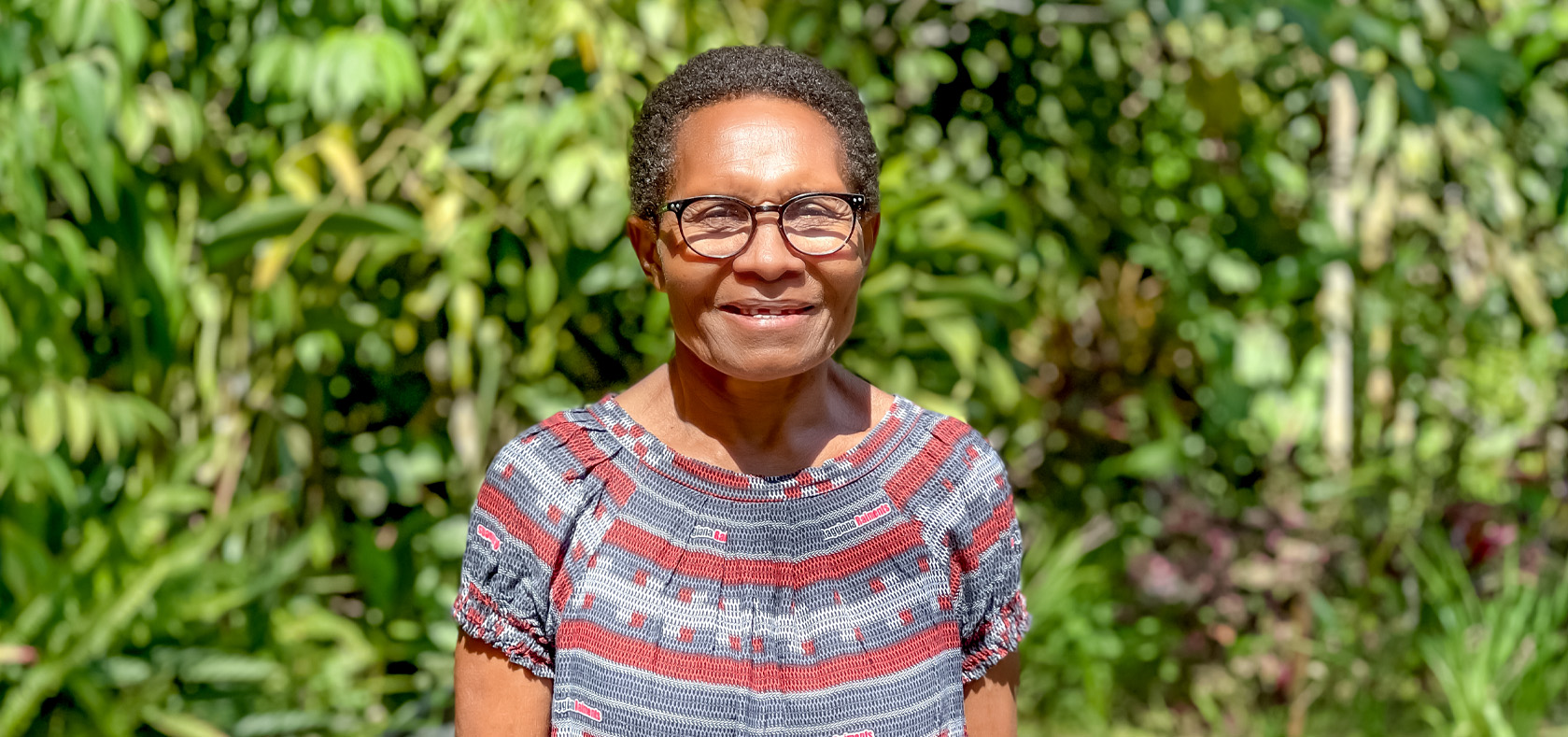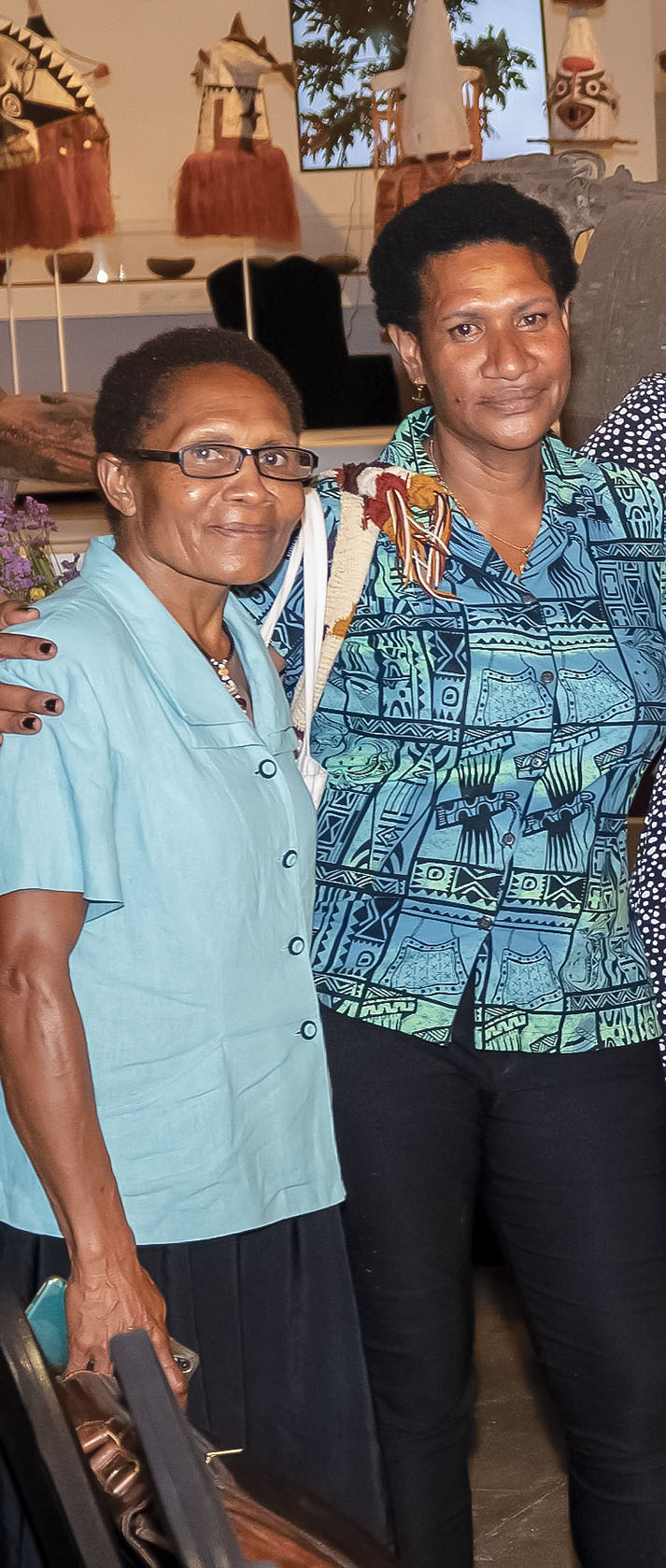The Women Make Change Stories in Papua New Guinea: "No battle is too big for Veronica Simogun"
For 15 years, Veronica Simogun lived through domestic abuse, while also trying to raise her five children and keep them safe.
Date:

Prior to her marriage, Veronica worked as an airway operations officer. She grew up in a stable and secure home with a father who protected his family and looked out for them. This was the marriage and life that she grew up dreaming of, with a caring husband and happy, healthy children.
However, when Veronica married at 18 and started a family, it became difficult for her to manage both work and family with the little support she received from her husband in caring for their children.
As a result, she was forced to resign from work and become a full-time mother. While Veronica continued to experience abuse at the hands of her husband, for the sake of their children, she helped him build a successful business and tried to create a good home. However, everything changed when her husband brought another woman into their marriage.
It was Veronica’s desire to see her children grow up in a stable and secure home that gave her the courage to leave her abusive marriage and the life she built with him.

In 1997, Veronica took her children and moved back to her village. Veronica found sanctuary in her church and in pastoral work helping other disadvantaged families. It was during this time that she attended her first formal training on human rights and family protection laws. A moment that changed the course of her story
Following an earthquake in 2002 that destroyed her home and a long bout of illness, Veronica moved to Wewak town with her children.
After struggling for a year, Veronica sought refuge with the East Sepik Council of Women who offered her a safe place to stay and a job assisting in social welfare case management.
The work involved registering social welfare cases and linking clients with the right people to help them with things like mediation, paralegal advice, counseling, and access to safe houses and repatriation.
For Veronica, this work marked the beginning of her own healing and recovery from the trauma she had experienced. I was the first step into her calling as an advocate for peaceful lives, homes, and communities.
“I was drawn to that work because of what I went through. When I needed that help, I didn’t know where to go.”
Veronica took on this role with passion and determination. Along with her formal training, Veronica made it a point to research and familiarize herself with government processes to effectively carry out her duties.
"I spent a lot of time training myself to understand how the court works and how to do the paperwork to get protection orders and child support."
While Veronica was focused on getting her life and the lives of her children back on track, meeting another man was not a priority for her. However, things changed when a kind-hearted man came into her life.
"He was the best. We had heated arguments, but he never once laid a hand on me. He knew I liked to laugh and always used jokes to break the tension. He was loving, generous, and caring, a provider, and he treated my children like his own. He reminded me of my own dad, a strong leader who had a gentle side." Veronica and her husband had 13 happy and supportive years together before he sadly passed away. However, during that time, he encouraged Veronica and helped build her confidence.
As a reserve police officer himself, he encouraged Veronica to enroll as a new recruit for the community auxiliary police.
"After our training, we came away decked out in our brand-new blue police uniform, and the feeling that overtook me was something else. I had grown muscles overnight." Veronica says.
The support and respect she received at home helped her own healing, and with her growing experience supporting others in similar circumstances, Veronica grew from strength to strength.
"I would like to see that every woman that comes into this world lives free of all forms of violence, and I think it is my duty to keep working to ensure this happens."
— Veronica Simogun, Papua New Guinea.
In 2005, she became a volunteer trainer on gender and human rights with Help Resources and built her network with churches and other communities.
When the programme ended in 2008, she continued this work with various organizations until 2012, when she established her own community-based organization (CBO), Family for Change.
As director of this new CBO, Veronica made the decision to only take on one community at a time until they saw results. After initially canvassing a number of communities, she saw that one community, Yambem in Turubu LLG, Wewak District, had taken ownership of the messages around changing harmful behaviors.
Family for Change worked closely with their Ward Councillor to run the Community Healing and Rebuilding Programme, which included training and sensitizing the community on gender-based violence and human rights.
As a result of this work, the community created its own bylaws to respond to community issues more proactively and set aside time every Wednesday to review and discuss issues in a peaceful way. The programme also included work with male advocates and peer counseling. This inspired the Turubu LLG and surrounding communities to set up community rules and work towards changing attitudes on gender and the rights of women. With this impact in Turubu, Family for Change began work at a new site, Dagua LLG, Wewak District.
This transformative work has not gone unnoticed. In 2017, Veronica was awarded the International Woman of Courage Award by the US First Secretary, which she received in Washington, DC, from the former First Lady, Melania Trump.
In 2018, she received the Point of Light Award from the British High Commissioner in Wewak and funding from the British High Commission for their Seif Haus.
However, even with these accolades, Veronica knows there is much more that needs to be done to support the many families who are still living in unsafe and violent situations.
"I would like to see that every woman that comes into this world lives free of all forms of violence, and I think it is my duty to keep working to ensure this happens."
I started Family for Change to undertake programmes to help women in violent and abusive relationships, and we have separate programmes for men to undertake to support the women. I want to target men, women, and children to create better, secure, and safe homes for all to live in."
The Women Make Change Digital Stories are a collection of short stories aimed at highlighting the transformative impact of women’s leadership in communities in Papua New Guinea. The stories also captured the journeys of male advocates who are supporting women’s leadership. UN Women and the Queensland University of Technology co-produced the digital stories with the storytellers, who narrated and took photographs to complement their stories. Currently, the stories are used as resources to create spaces in communities and in mass media to discuss women’s political leadership in Papua New Guinea. Since independence in 1975, PNG has had only nine women elected to the National Parliament.
The Women Make the Change programme is funded by the Government of Australia and the Government of New Zealand.
The article was originally published in the Papua New Guinea Post-Courier. Follow the link to read the story